Psychology
Do You Really Want to Work With Kids?
It might not be what you expect.
Posted July 21, 2020
Last semester, I taught all child psychology all the time. The first assignment in every class was an introductory post that asked students to share their career goals and aspirations. Guess how many times I read a version of, “I’m taking this class because I want to be a child psychologist”?
After reading post after post that said that, the first non-future-child-psychologist post elicited such a visibly surprised reaction that my husband, who was nearby as I graded, asked what happened.

When I was a child, I really wanted to be a marine biologist because I loved dolphins. I envisioned a career that involved swimming and playing with them all day long. All the images of marine biologists I saw involved getting in the water with ocean mammals. Glorious.
It only took a couple of biology classes to change that picture. Uh, marine biologists are more likely to do things like test algae? But I was going to swim and play with dolphins!
I’m thankful for the biology teachers who burst my marine-biologist-as-dolphin-playmate bubble, and I see a parallel to some of my child psychology students.
Why do many of my students want to become child psychologists/therapists? Because they love kids. Many of them wrote about their love for children as the reason they were taking the class and pursuing the career. That, of course, makes sense, and I’m sure many would argue should be a requirement of the job. I enjoyed reading their posts, yet I couldn’t help but wonder about their expectations.
When I discussed this trend with a colleague, she said, “Those are intro classes. A lot of intro students have the TV version of psychologists in their minds.” I certainly had the TV version of marine biologists in my mind. Even if I had become a marine biologist fortunate enough to get a rare position working with dolphins, I most certainly wouldn’t have been playing with happy and healthy dolphins all day.

Don’t get me wrong, I’m thrilled my students love children and I’m glad so many of them want to work with them. I’m sure many of them understand that working in child psychology/mental health is not all sunshine and roses, and given that my expertise is violence, abuse, and trauma, I sometimes have to remind myself that more positive experiences exist (hello, positive psychology).
Yet, as many of us know, psychology and child-related jobs often trend toward the negative (e.g. adverse childhood experiences). Those future child psychologists aren’t often going to hear, “My child is happy and healthy. Please help them stay that way.” One can dream …
Dr. Ron Mossler, chair of the psychology department at Los Angeles Valley College, worked with children in private practice for 20 years. His insights are particularly valuable:
Students often want to work with children because they have had good experiences with school children or their nieces and nephews. We look forward to playing with them and making them feel special. Those experiences are such fun! But the children we are likely to see professionally are not going to be like the children you know, and who typically respond well to praise and to consequences. No matter how the day was, you still get a hug to top it off. The children who need help are much more varied. Other than a few specialized positions, no one builds a career seeing children who behave well and respond positively to most of the things you say.
When working with children in a therapeutic or social service setting, most opportunities are with those children who exhibit severe emotional problems, who have been abused, show behavior problems, are on the autism spectrum, or exhibit a combination of psychological disorders. Teenagers can be manipulative or unresponsive; parents often want their children ‘fixed.’ And there are rarely simple, short-term solutions. Unlike nieces and nephews, most interventions take thought, attention, and planning.

A colleague, an MFT who worked with teenagers, echoed Dr. Mossler’s comments. For teenagers in particular, she suggested, it takes a lot of time and effort to build relationships and get to a place where they can trust you. In other words, it’s not easy … but it’s worth it.
Another colleague worked in a treatment facility for adolescents right after obtaining her bachelor’s degree in psychology. She lasted a week before she got punched by a resident and left. She didn’t give up on kids; she shifted direction and became a teacher.
Given the reality, there are countless examples and approaches to working with kids. Mossler’s offers a refreshing and honest perspective, as well as helpful advice:
I particularly enjoyed working with difficult children. I learned a lot by meeting with teachers, phoning pediatricians, and researching different techniques. I had different “hooks” that I used to keep children and adolescents engaged and wanting to come back next week—my favorites were a nerf basketball, puzzles, and card tricks. Engaging in those activities came naturally to me. You will need to find your own set of activities. And if you are in the field it takes a different set of skills and sometimes even more patience.
I usually loved going to work and enjoyed the successes—but I didn’t just play every day. It was definitely work, and sometimes hard work at that. And it was never simply fun and games.
I hope everyone’s work is sunshine and roses. I do. In fact, I focus on primary prevention in my career because I want to foster communities and environment so healthy that the “bad stuff” can’t even take root. But it’s also important that we have realistic expectations. Someone who only wants to play with dolphins and in no way wants to deal with algae probably shouldn’t be a marine biologist. Yet for people who love kids and want to work with them, it’s clear from talking to my colleagues that it may be hard work, but it will certainly be worth it.




